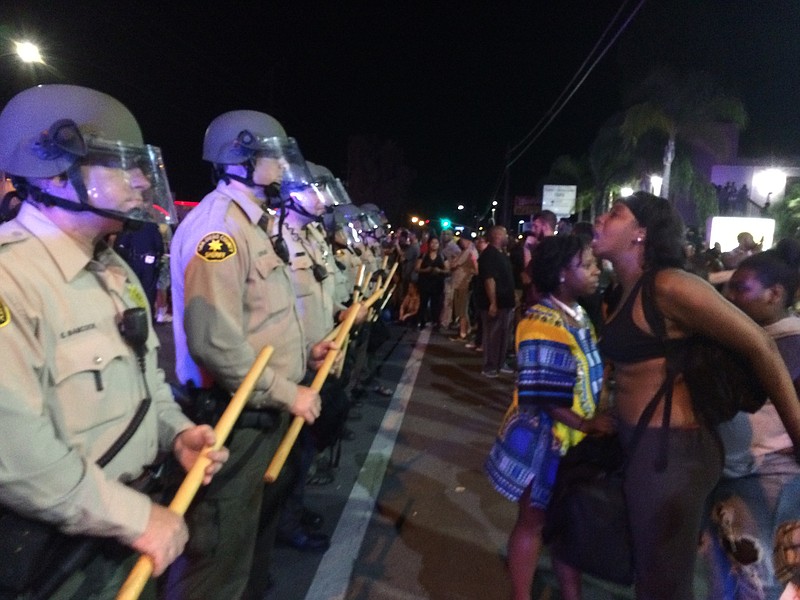The secret to more diversity in law enforcement, according to the Obama Justice Department, is not giving so much weight to criminal background checks or citizenship in the hiring process.
That means exactly what you think it means.
Law enforcement agencies, the department's report states, should not automatically disqualify applicants who have a criminal record, have used drugs or are not U.S. citizens.
There's more.
The report, titled "Advancing Diversity in Law Enforcement," which grew out of the 2014 incident in Ferguson, Mo., a city which had a disproportionate number of nonminority police officers to its population, also suggests that requiring written or physical agility tests could be barriers for racial minorities and women.
Imagine, then, the new employment ad:
"Police department seeking officers for challenging, dangerous career. Criminal record OK. Drugs fine. No brains, no fitness, no citizenship, no problem."
No applicant could miss. The Justice Department, which released the report (evidently with a straight face) with the Equal Employment Opportunity Commission, is certainly correct. Removing those barriers would increase diversity. It also could make a mockery of law enforcement, but it would increase diversity.
The Chattanooga Police Department, as we have cited in this space before, has wanted to increase its diversity for years and has tried a variety of ways to do so. It has had some success but, administrators have been quick to say, never the success it desired.
It currently has 454 sworn officers, 100 of whom are nonwhite.
But the local police department is cited in the Justice Department report for its paid internship program, which targets "individuals from populations underrepresented" who may want to pursue a public safety career. The program gives youth "mentoring customized" in areas such as physical fitness or written tests that might benefit them in the hiring process.
The report also mentions the CPD for its Recruiting, Engagement, Selection, Transfer, Assignment, and Retention Team (RESTART), which brings together members of the force, other community members and professionals to "ensure equity and aggressively support diversity" in a range of practices.
It further praises the state of Tennessee for passing a law that allows noncitizens who served in the U.S. military and were honorably discharged to be considered for law enforcement.
But, significantly, the report itself seems discriminatory as it dances around saying - without using the actual words - that more minorities should be assumed to have criminal records and drug-use histories than nonminorities and that minorities cannot take written tests as well as nonminorities. And, therefore, in these cases, they would need special dispensations.
"When using criminal background checks [in hiring]," the report puts it, "employers should consider the nature of the crime, the time elapsed, and the nature of the job."
It doesn't say, however, what crimes are too egregious or how much time should be elapsed since the crime. Law enforcement agencies might need to know these things to avoid being the defendants of unnecessary lawsuits. For instance, would an aggravated assault in the last five years be too much but theft over $1,000 be acceptable?
Neither does it say how much "previous drug use" might be OK. Where might the line fall between dabbling in pot and a years-long addiction to drugs?
It's understandable that a written test should not be the only criteria in hiring, but a poor showing on knowledge of the law, law enforcement skills and how to deal with people should be significant in the qualifying process.
However, the report states, "while skills like reading comprehension and arithmatic may be important for these positions, tests that focus solely on these skills may not sufficiently or accurately represent the skills needed for the position and thus unnecessarily screen out qualified applicants."
And while the report indicates that federal law allows law enforcement agencies to impose a citizenship requirement when it is authorized by state or local law, it says "this requirement may prevent a considerable number of racial and ethnic minorities - many of whom have valuable foreign language skills - from being hired.
Diversity is necessary and helpful in law enforcement, but as with public education policies, decisions are best made not because of a federal report but closest to the community in question.
With the Chattanooga Police Department, candidates must be a U.S. citizen (per Tennessee law) and a Tennessee resident. They can be accepted if they have a minor misdemeanor on their record but not a felony or serious misdemeanor conviction. In addition to passing written and physical exams, they also must pass a polygraph exam, medical exam and drug test. Candidates are further subject to an extensive background investigation, which includes criminal history, employment history, scholastic record and driving record.
As long as any law enforcement agency is pursuing diversity, we don't believe it should feel compelled to water down its qualifications for one of the most difficult and dangerous jobs around.
